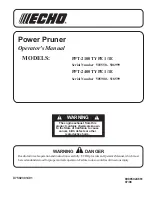
GB
- 345 -
•
Follow the instructions for lubrication, chain tension and
replacement of accessories.
A chain which is not properly ten-
sioned or lubricated can either break or increase the risk of kick-
back.
•
Keep the handles dry, clean and free from oil and grease.
Greasy or oily handles are slippery and will result in loss of con-
trol.
•
Only use the chainsaw to cut wood. The chain must only be
used to perform the work for which it is intended. For ex-
ample: Never use the chainsaw to cut plastic or brickwork
or building materials which are not made of wood.
Use of the
chainsaw for non-intended or non-approved work can create dan-
gerous situations.
•
When transporting the equipment, remove the battery pack and
drain the chain oil from the tank.
Causes of and ways to avoid recoil
Recoil can occur if the tip of the chain bar touches an item or if the
wood bends and jams the saw chain in the cut.
In many cases contact with the bar tip can result in an unexpected re-
action aimed backwards in which the chain bar is catapulted upwards
towards the operator.
Jamming the saw chain on the top of the chain bar can catapult the
bar towards the operator at high speed.
Any of these reactions can result in you losing control over the saw
and possibly su
ff
ering serious injuries. You should therefore not rely
totally on the safety equipment
fi
tted to the chainsaw. When using a
chainsaw you should take various precautions to enable you to work
without su
ff
ering accidents or injuries.
Recoil is the result of incorrect or wrong use of the electric tool. It can
be prevented by suitable precautions, as described below:
•
Hold the saw firmly with both hands, with fingers and
Anl_PE_AHE_18_Li_Basic_SPK7.indb 345
Anl_PE_AHE_18_Li_Basic_SPK7.indb 345
15.01.16 13:09
15.01.16 13:09
















































